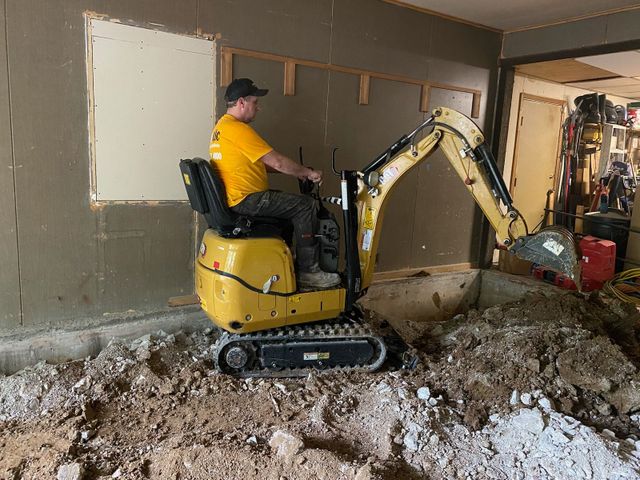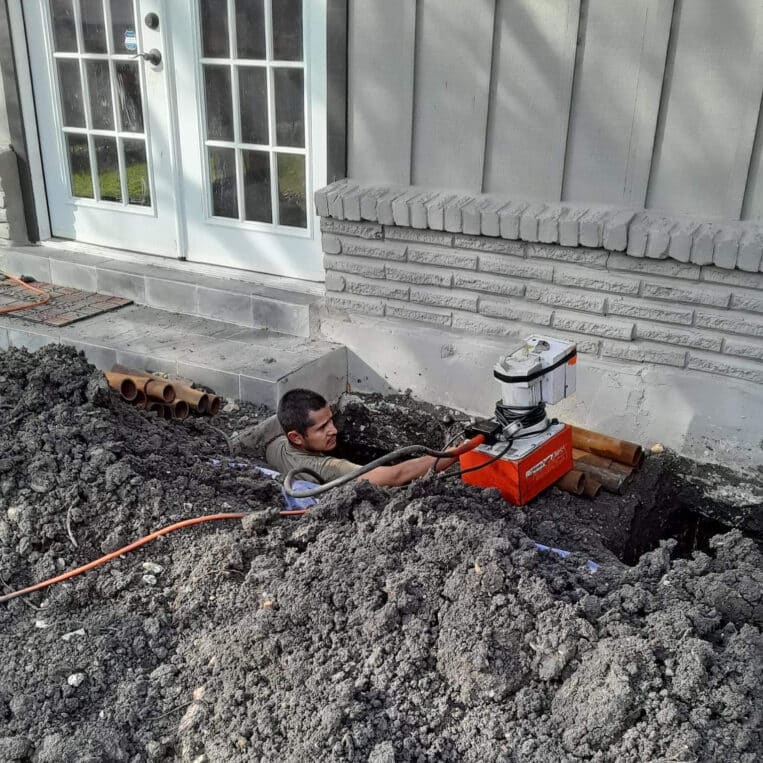Homeowner’s Starter Guide to Foundation Repair
The Benefits of Routine Assessments for Foundation Repair Work and Long-Term Stability
Routine inspections for foundation repair work are crucial for keeping the structural stability of a home. They help recognize minor issues prior to they intensify into considerable issues. House owners commonly ignore the effect of these evaluations on long-lasting stability and safety. By recognizing the advantages of routine examinations, it becomes clear how proactive procedures can influence residential property worth. Yet, many still undervalue the relevance of a solid foundation. What variables should be taken into consideration when assessing foundation health?
Understanding the Value of a Strong Foundation
Frequently neglected, a solid foundation is important for the stability and longevity of any type of structure. It works as the bedrock upon which buildings, bridges, and various other facilities are put up, ensuring their ability to endure ecological stresses. A well-constructed foundation disperses weight equally, protecting against irregular settling and reducing the threat of architectural damage gradually.
A solid foundation secures against outside aspects such as dampness, insects, and soil motion, which can jeopardize structural integrity. By investing in durable foundation layout and building and construction, homeowner can stay clear of expensive repair services and boost the total safety and security of their structures.
Normal assessments also play a critical role in preserving foundation health and wellness, enabling early detection of potential problems. Eventually, recognizing the value of a solid foundation cultivates an aggressive strategy to building and construction and upkeep, making sure that structures remain risk-free and useful for several years to come.
Typical Indications of Foundation Issues
Recognizing typical signs of foundation concerns is essential for property owners and property managers alike. These indicators can vary but often include noticeable cracks in walls, floorings, or ceilings, which may recommend moving or working out. Windows and doors that stick or fail to shut appropriately may also indicate underlying foundation issues. Additionally, gaps in between walls and ceilings or unequal floorings can be indications of instability. Home owners might observe water pooling in particular areas of the home, suggesting water drainage issues that could impact the foundation's integrity. Inside and exterior wall protruding can further show architectural problems. A stuffy smell or mold and mildew development may suggest dampness invasion connected to foundation issues. Recognizing these indications promptly enables for prompt treatments, possibly lessening expensive repairs and making sure the long-lasting security of the property.

The Duty of Regular Evaluations in Very Early Discovery
Routine assessments play a crucial duty in the very early detection of foundation problems, enabling house owners to resolve potential troubles prior to they rise. By consistently examining the condition of a foundation, experts can determine refined signs of distress, such as small cracks, unequal settling, or dampness intrusion. These early indicators usually work as forerunners to much more extreme architectural issues if left uncontrolled.
Specialist examiners make use of specialized devices and methods to analyze foundation integrity completely, guaranteeing that any arising worries are documented and kept an eye on. This proactive technique not just help in preserving the foundation's stability but additionally promotes a much deeper understanding of the building's general health.
The understandings got from routine assessments equip home owners to make informed decisions pertaining to required repairs and maintenance (Foundation Repair). Eventually, the duty of very early detection through inspections is vital in protecting the durability and security of a home's foundation
Expense Financial Savings Via Positive Upkeep
Aggressive upkeep can lead to substantial price financial savings for home owners by addressing foundation problems prior to they require comprehensive repair work. Regular assessments permit the very early recognition of small issues, such as fractures or drainage problems, which can be corrected at a portion of the cost of major repairs. By investing in regular evaluations, house owners can prevent the rise of these issues, stopping the demand for pricey treatments like foundation or extensive excavation. Proactive upkeep assists in timely modifications to water drainage systems or landscape design, lowering the threat of water damages and soil erosion that can jeopardize foundation stability. Eventually, keeping a solid foundation through consistent maintenance not only maintains the home's structural honesty yet additionally reduces monetary strain over time. This approach cultivates lasting stability, making sure that property owners can take pleasure in assurance while safeguarding their investment.
Enhancing Home Value With a Strong Foundation
A solid foundation can substantially enhance a building's worth, making it an essential facet for any kind of property owner. Buyers frequently focus on structural honesty when evaluating potential acquisitions, and a well-maintained foundation represents dependability and safety. Features with a robust foundation are much less susceptible to concerns such as cracks, water damages, and parasite problems, which can deter prospective buyers and diminish market price.
Additionally, a solid foundation can bring about reduced insurance policy costs, as insurance companies recognize the decreased risk connected official statement with stable frameworks. House owners buying foundation repair services and regular inspections show dedication to building maintenance, which can foster customer self-confidence. view it Furthermore, residential or commercial properties with a solid foundation often demand higher resale rates, as they are regarded as long-term financial investments. Consequently, maintaining an audio foundation is not just important for structural health but also plays a significant function in making best use of building value in an affordable property market.

Picking the Right Professionals for Inspections
Assuring a strong foundation is a substantial investment, and picking the right specialists for inspections plays a critical duty in maintaining that integrity. Home owners need to seek qualified and skilled foundation examiners that concentrate on determining prospective concerns. It is vital to validate their credentials, including accreditations and insurance coverage, to verify they meet industry requirements.
In addition, reviewing evaluations and requesting for references can provide understanding into the examiner's reliability and knowledge. Experts must employ advanced analysis devices and have a comprehensive understanding of neighborhood soil conditions and building codes.
Furthermore, it is useful to select examiners that use detailed reports, describing any problems and advising services. This transparency helps property owners make informed choices around needed fixings. Concrete Lifting. Inevitably, choosing qualified professionals warranties that foundation inspections are comprehensive and precise, cultivating lasting security and satisfaction for building owners
Producing an Upkeep Arrange for Your Home
Creating a maintenance timetable is vital for home owners to guarantee their residential or commercial property stays in excellent condition. It involves establishing the frequency of examinations, focusing on areas that may position threats, and documenting all maintenance activities. This structured technique not only aids in recognizing possible issues early however likewise helps in planning for required fixings properly.
Developing Inspection Regularity
Establishing a regular examination frequency is crucial for maintaining a home's foundation integrity. Property owners ought to take into consideration different this hyperlink aspects, including the home's age, soil type, and climate conditions, to figure out just how usually inspections should occur. Commonly, an annual evaluation is recommended, however homes in areas with severe weather or unpredictable soil might call for even more regular analyses. By developing an upkeep routine, homeowners can proactively determine prospective problems and resolve them before they rise right into pricey fixings. Uniformity in examinations not only safeguards the foundation however also improves general residential property value. Establishing pointers or collaborating with an expert can assure that these important analyses are not neglected, eventually adding to the long-lasting stability of the home.
Prioritizing Locations of Worry
Routinely focusing on locations of concern is essential for a reliable upkeep schedule that resolves a home's foundation requirements. Home owners ought to perform detailed inspections to determine prospective problems such as cracks, uneven floorings, and water pooling around the foundation. By evaluating these areas, they can figure out which problems need prompt attention versus those that can be kept track of over time. It is vital to consider variables such as the extent of the damages, the prospective threat to the home, and ecological impacts. Creating a maintenance timetable that concentrates on these concerns guarantees that sources are designated successfully, eventually protecting the stability of the foundation and minimizing long-term repair service prices. An aggressive strategy can significantly enhance a home's overall security and security.
Recording Maintenance Activities

Regularly Asked Inquiries
Just how Usually Should I Set Up Foundation Inspections?
The regularity of foundation examinations typically relies on numerous variables, including regional climate and dirt problems. Professionals recommend scheduling examinations at least yearly, or extra often if problems are presumed or previous repairs were made.
What Equipment Are Used During Foundation Inspections?
During foundation evaluations, professionals frequently use devices such as laser levels, wetness meters, and digital cams. These instruments assist assess structural integrity, determine possible issues, and paper problems for precise coverage and essential repair services.
Can I Perform a Structure Inspection Myself?
One can attempt a structure evaluation separately, yet competence in architectural stability is necessary. Expertise of signs suggesting concerns, along with proper tools, enhances precision, making specialist analyses often extra reliable for comprehensive assessments.
Exist Seasonal Considerations for Examinations?
Seasonal factors to consider for evaluations include checking wetness levels, temperature fluctuations, and freeze-thaw cycles. These factors can influence dirt stability and foundation integrity, making it vital to arrange evaluations during suitable times throughout the year for ideal evaluation.
What Certifications Should Assessors Have for Foundation Job?
Inspectors need to possess appropriate certifications, experience in architectural engineering or geology, understanding of local building regulations, and familiarity with foundation repair work strategies. These credentials ensure they can accurately assess conditions and suggest appropriate services for foundation concerns.